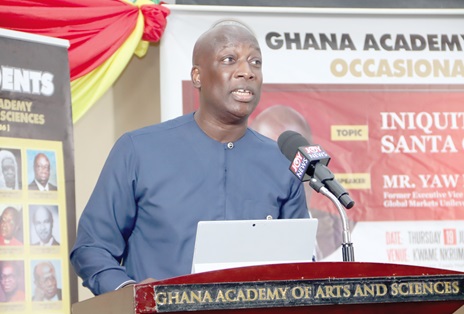Corporate executive and governance thinker, Yaw Nsarkoh, has called for urgent reform of political campaign financing to safeguard the country’s democracy from elite capture and systemic corruption.
He explained that the opaque and unregulated nature of campaign financing lies at the heart of the nation’s dysfunctional political culture which ultimately serves the interests of a privileged few.
“Today, no one really knows how much a candidate spends. No one knows where the money is sourced.
No one seems bound by any enforced laws to make all of this transparent.
This opacity is the source of all evil in a Santa Claus democracy, for it becomes the surest corridor to money laundering and political pay-through,” he said.
GAAS lecture
Mr Nsarkoh, who is a former Executive Vice-President of Unilever Global Markets, made the call during lecture at the Ghana Academy of Arts and Sciences last Thursday, on the theme: “Iniquities of Inequity in Our Santa Claus Democracy.”
It explored how democracy, stripped of substance and driven by transactional politics, has deepened inequality.
Mr Nsarkoh also examined how a gift-giving, short-termist political culture (Santa Claus democracy) has eroded civic agency and institutional integrity across Ghana and much of Africa.
The lecture was attended by fellows of the academy, other leading academics, professionals, policy analysts and students from the Labone Senior High School (SHS), among others.
Expenditure
Citing a senior official of the Electoral Commission (EC), Mr Nsarkoh revealed that the commission currently held no data on campaign financing, adding that the 1992 Constitution and related legal instruments were silent on this crucial governance issue.
Mr Nsarkoh warned that unless comprehensive laws were enacted to compel full disclosure of political donations and campaign expenditures, the country’s multi-party democracy risked being controlled by a manipulative elite whose financial backing determined political outcomes.
He described this situation as the root of all evil in what he termed as “Santa Claus democracies.”
“This infernal crater is the root of all evils in a Santa Claus democracy,” he said, suggesting that both the National Democratic Congress (NDC) and the New Patriotic Party (NPP) have failed to address this legal vacuum for reasons many can speculate.
Binding laws
Mr Nsarkoh urged civil society, the media and reform-minded politicians to rally for the creation of binding campaign finance disclosure laws and an independent oversight mechanism to track political funding in real-time.
“If it is the last thing we do in this fight, we must devote ourselves to cleaning up the space with resolve and conviction. It will not be easy, for corruption and the roots of corruption will fight back resolutely. It is in the nature of that beast, its purveyors have powerful vested interests in the status quo,” he said.
Mr Nsarkoh also linked opaque campaign financing to the poor policy delivery by successive governments, questioning whether the NPP and NDC were truly people-based parties or merely electoral machines serving narrow interests.
He therefore advocated political parties to develop internal cultures of learning and discipline, citing party academies in Singapore and China as examples where political leadership was tied to intellectual growth and policy competence.
Campaign gaps
Mr Nsarkoh said the gaps in political campaign financing had led to the surest corridor to money laundering and political favouritism.
“Thirty years into the Fourth Republic, many questions are being asked about whether the country had delivered the expected improvements and dividends in the livelihoods of the masses,” he said.
The questions, he noted, were relevant not only to the country but also to Africa in achieving democratic governance.
Participation in the process of political activities, he said, was too expensive for the majority of the population and called for urgent action to address the issue.
“We remain a pre-capitalist reality in the main, yet a minority of urban petty bourgeoisies have captured the state and its pretensions at democratic conduct, excluding the majority,” he added.
“This majority is marginalised, poor and not educated and do not speak the language of power due to suppression,” Mr Nsarkoh said.
Successful elections
Mr Nsarkoh said since 1992, Ghana had witnessed nine successful elections, and it was not surprising that the nation was described as a beacon of hope in democratic governance.
“Ghana was ushered into the Fourth Republic after more than a decade of military rule with heightened hopes,” he added.
“Democracy is to restore basic freedom and expected to deliver significantly improved livelihoods for its citizens,” he said.
The Ghana Statistical Service, in its import governance report, said more than 70 per cent of Ghanaians felt that the current political system provided little or no space for them to influence decision-making.
Mr Nsarkoh described the situation as a worrying indictment of the country’s pledge to democracy.
He called on the authorities to ensure that government institutions performed their mandate effectively and addressed the socio-economic needs of the citizenry, especially the poor, to achieve a democratic dividend.

